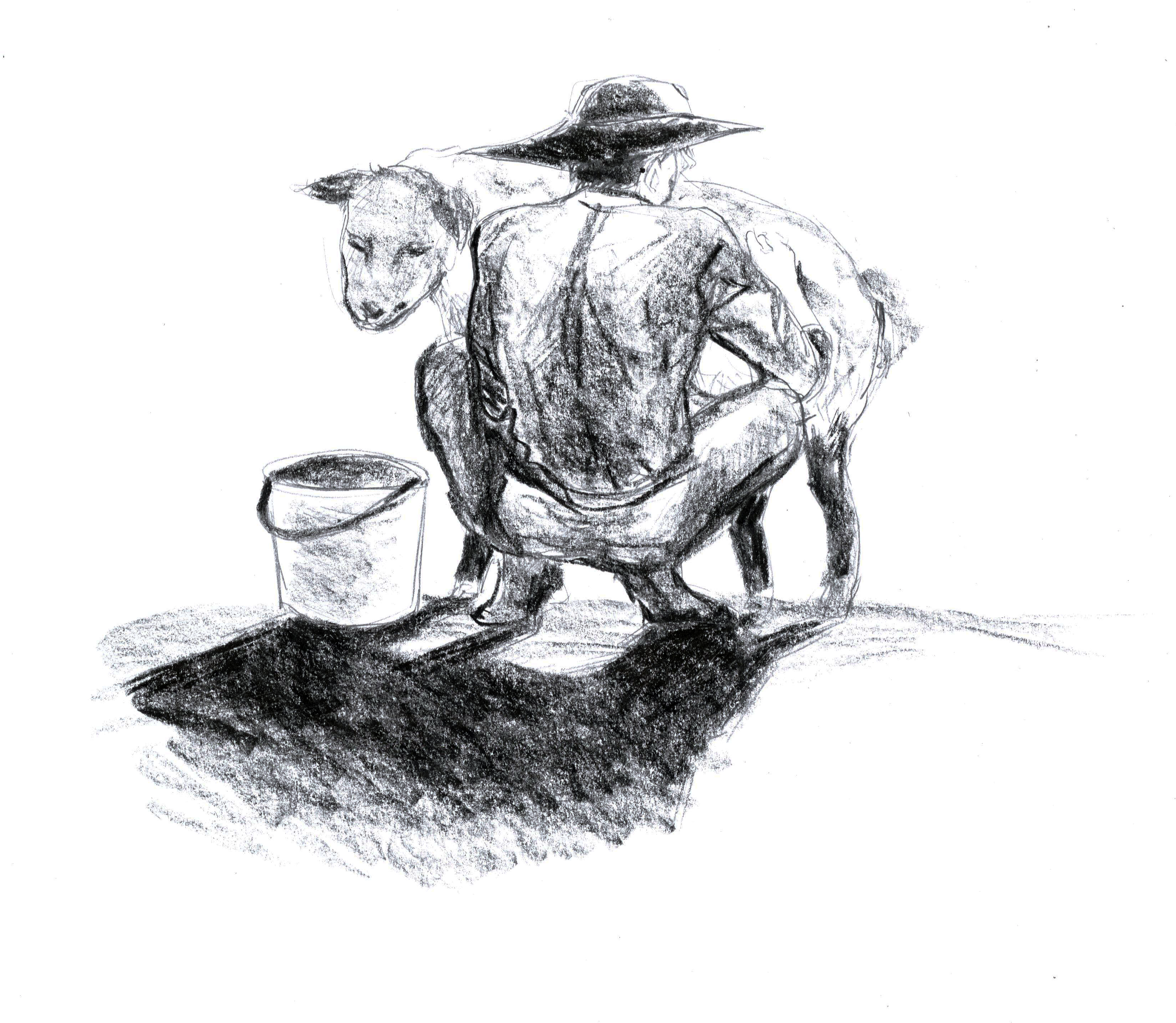
(Content advisory: blood, violence against animals)
At some point in the distant past, my father took a break from the apparently nonstop marathon of windsurfing, lounging on beaches and dating rich Argentines that defined his youth and left Montevideo to visit his rustic relatives in the Uruguayan countryside. Far from the city, under a cheerful blue sky, he was presented with an intact lamb (silent) and — after a clashing of incisors and a spurting of blood — returned it a touch less intact (violently squealing). Yes: My father castrated a lamb with his teeth. That is how you make good meat in the Uruguayan countryside. This particular lamb, my father told me, stopped squealing in fairly short order and led an idyllic pastoral life right up until the moment it was butchered. My father contrasted this with the American way, where if you are looking to castrate a lamb, the standard operating procedure involves a strong rubber band and a few good twists. The sheep suffers for weeks as it waits for its scrotum to shrivel up and fall off, but it bears this horrifying burden with Stoic silence. Step aside, Epictetus.
I don’t even like lamb (it tastes like it was aged in a sauna), but I cling to this anecdote of him mutilating a sheep gaucho-style because it seems definitive of the Uruguayan approach to food, and the Uruguayan approach to food is one of my only approaches to being Uruguayan. Can you imagine an American farmer castrating a lamb with his teeth? No. But ask a gaucho, archetype of sheer Uruguayan masculinity that he is, to castrate a lamb with anything but his teeth and he will probably snort and say something about gringos. Ultimately, I cling to the anecdote of the sheep because I, too, like to snort at gringos.
One of the few gifts of being Uruguayan is that there are plenty of ways to snort at gringo absurdities. Take beef, for example — a staple of both cuisines. Here is how you prepare beef in Uruguay: Sprinkle a little salt on the meat and put it on the grill. In America: Take some meat, smother it in sauce and … well, it beggars description. I can only imagine that Dr. Frankenstein himself, concluding that animating corpses was not very profitable, decided to set his freakish arts upon the American culinary establishment and met runaway success. How many sorts of rubs? For how many different time intervals was this thing smoked? What wood flavor? Am I even eating meat anymore? For God’s sake, there are reality shows about this.
Perhaps if Uruguayan television had the budget for it there would be a Gaucho Grill Masters too. I wouldn’t know — I left 13 years ago and haven’t been back. Hence my attachment — sentimental, perhaps — to our cuisine. Particularly, I am very proud of our “booming sheep and cattle industries.” The phrase is in quotes because I say it so often that it has become a well-worn path. Booming sheep and cattle industries. I envision a country that consists of one city with nice beaches (in fact there are at least two such stretches of coast) and a vast hinterland of sheep and cattle. Gauchos roam this undifferentiated rural landscape, sipping their mate as they graze and slaughter the cattle that are the pride of the nation. During World War II, we provided awe-inspiring amounts of sheep and cattle to the allies and were briefly anointed “the Switzerland of South America” for our livestock (and our welfare state). Sheep and cattle. Our commonwealth of gauchos.
To be Uruguayan, in my mind, is essentially to be proud of our livestock. I have never been to one of the sites of livestock production but I can only assume that if I did, I would immediately break into tears and kiss the sacred ground. What do gringos know of livestock? They kill their cattle with a bolt gun. (Probably we do too, but this reality is thankfully obscured by the overpowering picture of my father with the squealing sheep.) Uruguay popped into being ex nihilo as a colony of bearded men atop horses roaming vast herds of sheep and cattle, and that is just how it will be until the sun engulfs the earth, damn it. After the planet’s fiery extinction, our leather-clad men will become spandex-clad men, we will develop spacesuits for the sheep and cattle and we will herd them in the cold gaps between the galaxies until our universe dies. The primeval force of our cattle calls will defy the deaf vacuum of space and guide our herds through black holes into other, younger dimensions. We will be the Switzerland of the Hfgieyfrhf System. What else could Uruguay’s cosmic destiny be?
Back on planet Earth, in South Carolina, far from Uruguay, my father cooks our meat with a little salt and a lot of folksiness. In our family, cooking our beef and lamb like they do in the fatherland is an institution perpetually improvised — currently, the go-to arrangement consists of a remnant of our last broken grill propped up on two bricks in the fireplace. We’re hardly rich, but we’re not that poor. It’s just the proper way to cook asado. Perhaps unsurprisingly, given his bygone agrarian adventures, my father does not countenance the phrase “well done.” Mas crudo come el tigre, he tells us, the meat dripping red juices: Only the tiger eats it bloodier. And so with a proverb and a slab of meat, nestled away in the obscure periphery of a decaying empire, I am for a moment Uruguayan.







